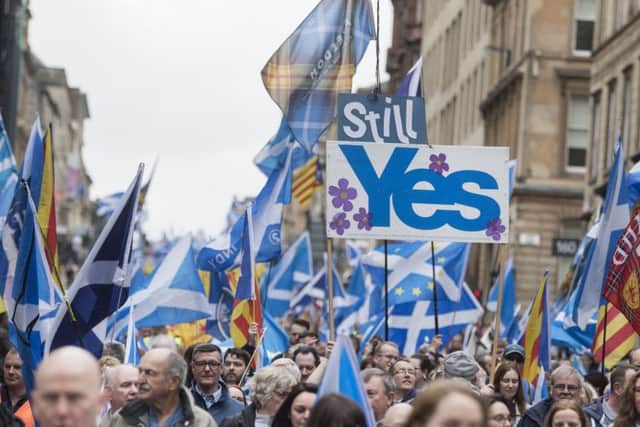Splits emerge in independence movement over SNP Growth Commission Report
Splits in the Yes movement opened up the day after Nicola Sturgeon’s party published its new economic case for independence. Jonathon Shafi, the co-founder of the Radical Independence Campaign, said the SNP’s economic plan must remove its most “damaging” elements.
At the end of last week, economist and former SNP MSP Andrew Wilson published the SNP’s long awaited report from the Sustainable Growth Commission. The 354-page document, commissioned by Sturgeon, set out a plan for Scotland to emulate 12 other small, advanced, independent nations including Denmark, New Zealand and Norway.
Advertisement
Hide AdAdvertisement
Hide AdThe paper, entitled Scotland, A New Case For Optimism, admitted that an independent Scotland would take up to 25 years to match the economic performance of such countries and outlined a ten-year plan to cut the country’s £13.3 billion deficit. Among the recommendations were plans to pay the rest of the UK an annual £5bn solidarity payment to cover Scotland’s share of UK debts and shared services. An independent Scotland would retain the pound outside a formal currency union with the rest of the UK until such time as the economy was strong enough to sustain a separate Scottish currency.


Wilson argued increasing growth could ensure public spending was kept above inflation while the deficit was being cut from 8.3 per cent of GDP to 2.6 per cent.
But the Scottish Conservatives and Labour claimed his approach would lead to years of cuts in public services worth billions of pounds.
The threat of austerity also concerned Shafi, who criticised the report for failing to take account of the views of trade unionists.
Shafi said: “In 2014 the independence movement was galvanised around opposition to crushing Westminster austerity. That too was the theme of the successful SNP general election campaign. The Growth Commission, despite claims to the opposite, would open the door to various forms of austerity politics.
“The report advocates tight fiscal discipline, reducing an independent Scotland’s prospective deficit to no more than three per cent in the first five to ten years, and lower than the growth rate during the transition period. This means reducing public spending to satisfy the City of London, who an independent Scottish Finance Minister would have to answer to.”
Shafi added: “The Radical Independence Campaign will engage with this debate in various ways, and believes that through the course of that debate the most damaging elements of the document can be altered. If they are not, it will be a very hard sell on the doorsteps of all those looking for bold change and who need radical economic transformation.”
Meanwhile, Labour claimed Wilson’s proposals would leave Scotland with a larger deficit than any other OECD country including Greece, Italy and Spain.
Advertisement
Hide AdAdvertisement
Hide AdThe SNP, however, accused Richard Leonard’s party of being “miserable” and said bringing down the deficit would be combined with public spending increases. Of Shafi’s remarks, an SNP spokesman said: “The Growth Commission report is explicitly anti-austerity, and offers an alternative to the Tory hard Brexit – which would leave Scotland facing real downward pressure on public spending as the economy slows. The report provides the opportunity to look afresh at the case for independence, to replace the despair of Brexit with optimism and hope about Scotland’s future. We look forward to hearing views on the report’s recommendations – from community groups, businesses and trade unions, to the wider Yes movement and across civic Scotland.”